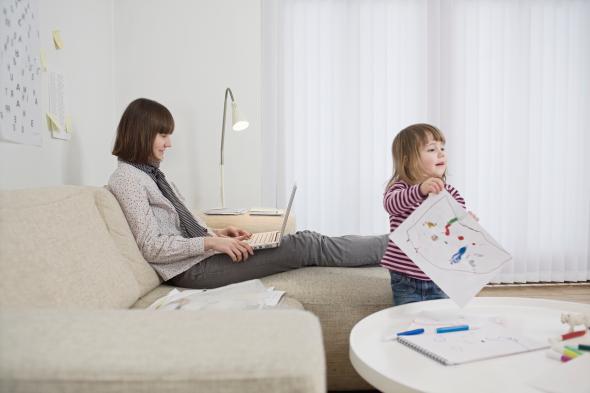In a recent essay on The Cut, “A Portrait of the Artist as a Young Mom,” Kim Brooks inquires into the compatibility of parenthood and creativity. Her approach is ruminative, open to possibilities, as she mulls over whether or not having children is a death knell to making art. Although Brooks herself—she is the author of a novel and a forthcoming memoir—has found it difficult to both mother and create, she quotes others writers who have found the experience to be a positive one, and refers to great books born of this dissonance. The takeaway is that maybe, sometimes, parenting can enrich creation, but getting to that place is really damn hard.
There’s no question that having children creates practical obstacles to producing work. Kids requires time—lots and lots of time. The time equation is made even harder to solve by our inadequate childcare system and our culture of overparenting. And yet the time crunch of parenting can also push people to make the best use of every minute. After my son was born I had a “now or never” feeling that was incredibly motivating. (Then again, like Brooks, I’m a writer, and it’s much easier and cheaper to find time and space to write than it is to work in other mediums.)
What’s more, when it comes to nurturing creativity and psychological insights—two good tools for culture-makers—having children can a very good thing. Maybe our reluctance to see it this way is a result of our belief that things that were traditionally done by women couldn’t possibly be as enriching as things done by men. They are.
As mothers have long known, and as fathers are beginning to discover, parenting is not a benign experience. Our pendulums are constantly swinging back and forth between wanting to make our kids feel safe and wanting them to be curious about and sensitive to the messy world around them. Trying to do both at once—or learning to live with “shape and chaos,” as one of Brooks’ interviewees puts it—can be fruitful. We as parents are there to help our children experience the world, to figure out their place in it, and to explore the distance between themselves and others. In this process, we are pushed to go through the same motions and discover where we’ve hardened over the years.
Also, our children are not benign. They are id-driven little creatures in whom we are supposed to instill self-control and empathy. In doing this with my son, I’ve discovered an unexpected side effect: As I’ve worked to suppress his instinctive force, the one inside me has woken up. Now, human desire has taken on a new vitality, tensions feel more fraught, wants and needs feel more urgent. It’s been a chance to recognize the parts of myself that the comforts and constraints of middle age make far too easy to overlook.
In addition to these psychological dramas, I’ve found that trying to satisfy my son’s curiosity has pushed me harder to think about language, meaning, and representation. All those whys and hows are exhausting, but they also make the power of words and ideas so immediate, so important, that sometimes I feel like I can hold them in my hand.
Writing in Bookforum last May, literary critic Parul Sehgal makes the case for family life as “experience, institution, and site for intellectual inquiry” and points to recent work including the novels Dept. of Speculation by Jenny Offill and 10:04 by Ben Lerner, the memoir The Argonauts by Maggie Nelson, and the nonfiction essays of Zadie Smith in which her children are “part of how and where she does her work, her thinking.” (Smith’s recent review of Anomalisa in the New York Review of Books is a great example.) In each, Sehgal writes,
the arrival (or the imminent arrival) of a child prompts a constellation of questions about selfhood and artmaking and the ethics of care. Many of these books adopt a copious, fragmentary form and gesture, some a bit shyly, toward radical possibilities for the domestic. On canvases big and small, they test out new answers to ancient questions: How best can we live this life and how best can we write about it, to what ends and with what compromises?
There will always be defeats for those of us who try to combine parenting and creative work: unmet deadlines, ignored children, insufficient bandwith. But there’ll be victories, too. As Maggie Nelson put it in an interview with Jezebel last year: “I’ve heard a lot of people say that ‘motherhood,’ whatever that entails, is a hackneyed topic, but I actually think we’re just about to hear a lot of news we haven’t ever heard before, and I’m super excited for it.” Me, too.
